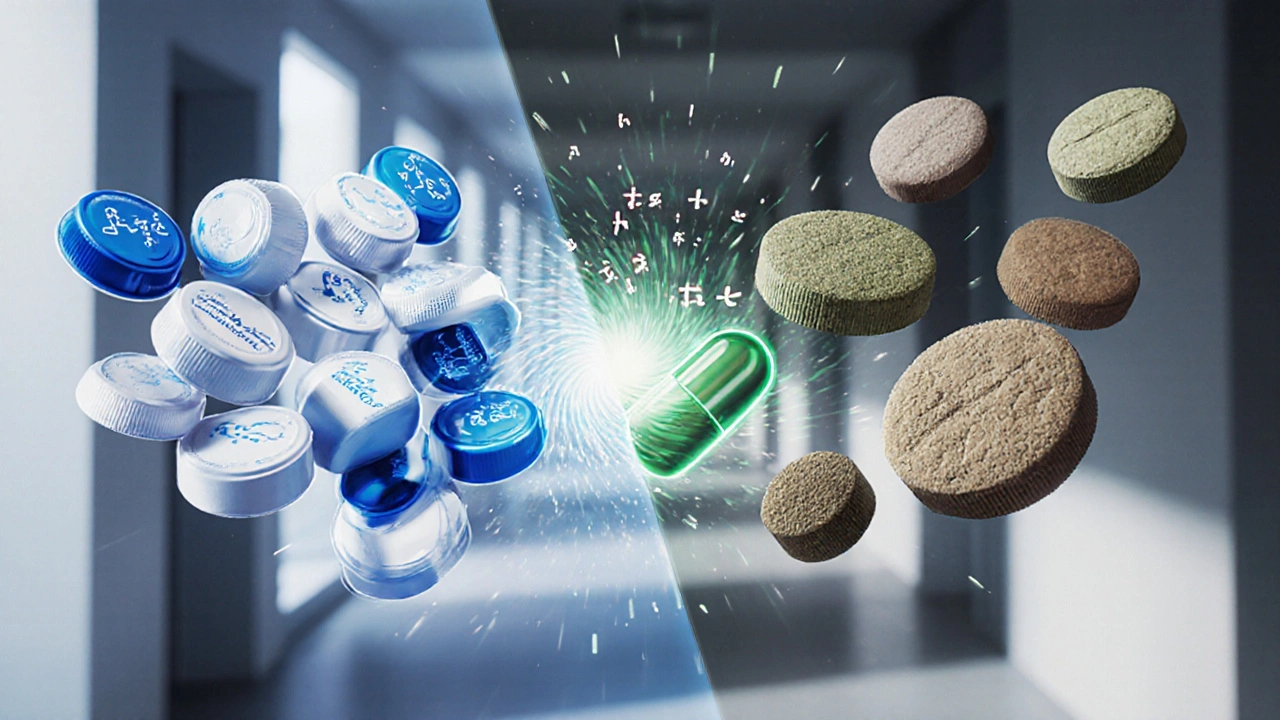
Answer these questions to find medications that best match your situation
No medications match your criteria. Try adjusting your selections.
Trying to figure out whether Levothroid is the right thyroid pill for you? You’re not alone. Millions of people swap between brands, wonder about liquid forms, or consider natural desiccated options. This guide breaks down Levothroid, its chemistry, and the most common alternatives so you can see side‑by‑side strengths, weaknesses, and when each one makes sense.
Levothroid is a prescription thyroid hormone replacement that contains levothyroxine sodium, a synthetic version of the hormone thyroxine (T4). It was introduced in the early 2000s as a generic-friendly option for hypothyroidism. The tablet delivers a precise dose of levothyroxine sodium, usually ranging from 25 µg to 300 µg per pill. In the body, levothyroxine is converted to the active hormone triiodothyronine (T3), normalizing metabolism, heart rate, and energy levels.
Levothyroxine mimics the natural T4 hormone produced by the thyroid gland. Once absorbed, about 80 % of the dose enters the bloodstream, binds to plasma proteins, and is slowly converted to T3 where needed. Because it’s a single‑dose, once‑daily medication, consistency is key: taking it at the same time each day (preferably on an empty stomach) helps keep blood‑test results stable.
Below are the most frequently mentioned alternatives, each with its own formulation quirks.

We’ll look at seven popular products: Synthroid, Armour Thyroid, Cytomel, Levoxyl, Tirosint, Nature‑Thyroid, and a compounded liquid form. The next table lines up dosage forms, typical strength ranges, and key pros/cons.
| Medication | Active Ingredient | Form | Strength Range | Typical Cost (US, per month) | Key Advantages | Key Drawbacks |
|---|---|---|---|---|---|---|
| Levothroid | Levothyroxine sodium | Tablet | 25‑300 µg | $10‑$20 | Consistent dosing, widely covered by insurance | Swallowing difficulty for some patients |
| Synthroid | Levothyroxine sodium | Tablet | 25‑300 µg | $15‑$30 | Long market presence, multiple brand options | Potential variability between batches |
| Armour Thyroid | Desiccated porcine thyroid (contains T4 & T3) | Tablet | 30‑120 mg (approx. 60‑240 µg T4) | $20‑$40 | Provides both T4 and T3 naturally | Hormone content can vary between pills |
| Cytomel | Liothyronine sodium (T3) | Tablet | 5‑25 µg | $30‑$50 | Fast‑acting, useful for combination therapy | Short half‑life; dosing can be tricky |
| Levoxyl | Levothyroxine sodium | Tablet | 25‑200 µg | $12‑$25 | Similar to Levothroid, often cheaper generic | May not be stocked in all pharmacies |
| Tirosint | Levothyroxine sodium | Softgel capsule / liquid | 25‑300 µg | $25‑$45 | Better absorption for patients with GI issues | Higher price, limited insurance coverage |
| Nature‑Thyroid | Desiccated porcine thyroid | Tablet | 30‑120 mg | $15‑$35 | Natural source, contains both T4 & T3 | Standardization concerns, not FDA‑approved for dosage consistency |
Below we unpack the bullet points from the table with real‑world considerations.
Pros: predictable levothyroxine content, low cost, easy insurance billing. Cons: only T4, tablets may cause esophageal irritation for some patients.
Pros: multiple dosage strengths, widely trusted brand name. Cons: slight batch‑to‑batch variability reported in some studies, price a bit higher than generic levothyroxine.
Pros: includes T3, which can improve symptoms like fatigue or brain fog for patients who don’t convert T4 efficiently. Cons: hormone level per tablet can vary by up to 10 %, making precise dosing harder.
Pros: fast‑acting T3 helps fine‑tune treatment, especially in combination therapy. Cons: short half‑life requires multiple daily doses; risk of heart‑related side‑effects if over‑dosed.
Pros: generic alternative with comparable bioavailability to Levothroid, often cheaper. Cons: not as widely stocked, may require special ordering.
Pros: softgel and liquid forms bypass the stomach’s acid barrier, ideal for patients with malabsorption, celiac disease, or those on calcium/iron supplements. Cons: price is the highest among pure T4 products, insurance often lists it as “non‑formulary.”
Pros: natural desiccated thyroid, often chosen by patients seeking a “holistic” approach. Cons: FDA does not regulate potency per pill; patients may need frequent blood‑test adjustments.

Always discuss any switch with your endocrinologist. A typical protocol: keep the same dose, re‑measure TSH after 6‑8 weeks, then adjust as needed.
Both contain levothyroxine sodium, but they are manufactured by different companies. Bioavailability is essentially identical, though some patients report subtle differences in how they feel, likely due to inactive fillers.
Usually yes, because liquid levothyroxine (like Tirosint) has the same potency per microgram. However, confirm the exact conversion with your doctor and retest TSH after 6 weeks.
Desiccated products deliver both T4 and T3 in a fixed ratio that mimics natural thyroid tissue. Patients whose bodies convert T4 to T3 poorly may feel better on these, but the fixed ratio can make precise dosing harder.
Combination therapy is sometimes prescribed for patients who still have symptoms on levothyroxine alone. The dose of Cytomel is low (5‑10 µg) and added only after careful TSH and symptom evaluation.
Levothyroxine reaches steady‑state levels after about 4‑6 weeks. T3‑only meds act faster, often within days, but their effects wear off quickly, requiring multiple daily doses.
Bottom line: Levothroid is a solid, cost‑effective T4 option for most patients, but alternatives exist for specific absorption issues, desire for T3, or personal preferences. Use the chart, weigh the pros and cons, and talk with your clinician before making a switch.
Hey folks, diving into Levothroid can feel like navigating a maze, but don’t sweat it – you’ve got this!
Think of it as the reliable captain steering your metabolism ship, steady and predictable.
Just remember to take it on an empty stomach, and the results will speak for themselves.
We’re all in this thyroid journey together, so keep sharing your wins!
It is imperative to acknowledge that pharmaceutical conglomerates have long manipulated the thyroid medication market, subtly steering patients toward Levothroid under the guise of generic affordability.
Such orchestrated branding campaigns are not merely commercial tactics but orchestrated attempts to suppress alternative therapies, thereby consolidating control over endocrine treatment paradigms.
One must remain vigilant of the hidden agendas pervasive within regulatory approvals.
When considering Levothroid versus its counterparts, it is essential to first understand the pharmacokinetic profile that distinguishes synthetic levothyroxine from desiccated thyroid extracts.
Levothroid delivers a precisely calibrated dose of T4, which, after intestinal absorption, undergoes peripheral conversion to the bioactive T3, thereby normalizing basal metabolic rate.
The consistency of this conversion is a cornerstone of therapeutic efficacy, particularly for patients with compromised deiodinase activity.
Moreover, the tablet formulation minimizes variability introduced by gastric pH fluctuations, a factor that can significantly affect bioavailability of other preparations.
In contrast, compounds such as Armour Thyroid contain a heterogeneous mixture of T4 and T3 derived from porcine sources, leading to inter‑tablet potency discrepancies that may necessitate frequent laboratory monitoring.
Clinical guidelines often recommend initiating therapy with a pure T4 agent like Levothroid, titrating in 12.5‑25 µg increments to achieve target serum TSH levels, thereby reducing the risk of iatrogenic thyrotoxicosis.
Patients who report persistent fatigue despite normalized TSH may benefit from adjunctive T3 supplementation, a strategy that must be individualized to avoid cardiac adverse events.
Cost considerations also play a pivotal role; Levothroid’s generic status typically translates into a monthly expense well below that of branded formulations such as Synthroid or the liquid soft‑gel Tirosint, which, while advantageous for malabsorption syndromes, often incur higher out‑of‑pocket charges.
Insurance coverage patterns frequently favor generic levothyroxine, further reinforcing its position as the first‑line agent in most formularies.
Nevertheless, clinicians should remain cognizant of patient‑specific factors, including concomitant calcium or iron supplementation, gastro‑intestinal disorders, and bariatric surgery history, all of which can impair tablet absorption and may warrant a switch to a liquid or soft‑gel preparation.
In practice, a trial of Tirosint or a compounded liquid levothyroxine for a period of 6‑8 weeks can elucidate whether absorption issues underlie suboptimal biochemical control.
The decision matrix thus integrates pharmacologic precision, economic feasibility, and individual tolerability, forming a comprehensive framework for optimal thyroid hormone replacement.
It is also noteworthy that recent meta‑analyses have demonstrated no statistically significant difference in quality‑of‑life outcomes between Levothroid and other synthetic T4 products when adherence is maintained.
Consequently, patient education regarding consistent dosing schedules and proper administration techniques remains paramount.
Finally, ongoing research into personalized thyroid hormone therapy may soon refine our approach, potentially incorporating genetic markers of deiodinase activity to tailor T4/T3 ratios for each individual.
Honestly, most of the hype around Levothroid is just marketing fluff; the drug is nothing more than a plain T4 pill.
Stop whining about tablets! Levothroid is a solid, reliable choice-if you can’t handle a pill, you’re kidding yourself.
Get it filled, take it consistently, and quit looking for miracle cures.
Levothroid works for many.
Here’s a quick rundown: Levothroid is cheap, stable, and works if you follow the fasting rule 😊.
If absorption is an issue, consider Tirosint’s liquid form.
From a pharmacoeconomic perspective, Levothroid’s cost‑effectiveness ratio surpasses most branded alternatives, provided that therapeutic monitoring adheres to ATA guidelines.
Moreover, its narrow therapeutic window mandates strict adherence to dosing protocols.
The bioequivalence of Levothroid aligns with FDA‑mandated ANDA standards, ensuring that its AUC and Cmax are within the 80‑125 % acceptance interval for generic levothyroxine.
This pharmacokinetic parity underpins its widespread formulary inclusion.
They say Levothroid is just a pill but it changes lives
It’s a quiet hero in the background
One must first contemplate the broader sociopolitical machinations that have coerced the medical establishment into privileging synthetic levothyroxine formulations such as Levothroid, thereby obfuscating the truth about natural desiccated thyroid equivalents.
It is an insidious stratagem, orchestrated by pharmaceutical lobbies in collusion with regulatory agencies, to enforce a monolithic treatment paradigm that marginalizes patient autonomy.
The veneer of scientific rigor is merely a façade, concealing the concealed agenda to amass profit at the expense of nuanced endocrine care.
Furthermore, the documented episode of batch-to-batch variability in Levothroid production, albeit statistically insignificant in isolation, becomes a symptom of systemic negligence when viewed through the lens of corporate oversight.
Patients who awaken to these covert operations often experience a cognitive dissonance, questioning the legitimacy of their prescribed regimen.
In my analysis, the integration of T3 via desiccated sources constitutes a more physiologically faithful approach, yet such options are systematically suppressed.
Indeed, the existence of covert formularies that prioritize Levothroid reflects an underlying hierarchy of influence, wherein boardroom negotiations eclipse clinical evidence.
Thus, the conscientious practitioner must navigate these turbulent waters with a critical eye, lest they become unwitting agents of a concealed pharmaceutical hegemony.
It is incumbent upon the informed patient to demand transparency, request independent labs, and scrutinize the provenance of their medication.
Only through such vigilance can the façade be dismantled, restoring equilibrium to thyroid therapeutics.
Let’s keep the focus on personalized dosing; if a patient truly struggles with tablets, a compounded liquid form is a viable alternative.
Hey everyone, great discussion!
Remember, the best thyroid med is the one that fits your lifestyle and keeps you feeling energetic.
Stay positive and keep sharing your experiences.
Philosophically speaking the thyroid is a metaphor for balance in life its rhythm echoing our own aspirations
Statistically, Levothroid’s bioequivalence parameters are within the accepted 90 % confidence interval, which directly contradicts the erroneous claims presented by non‑specialist sources.
Moreover, the pharmaceutical supply chain’s integrity is upheld by GMP compliance, rendering speculation about hidden conspiracies unfounded.
Consequently, clinicians should rely on evidence‑based guidelines rather than anecdotal dissent.
